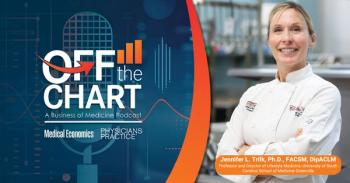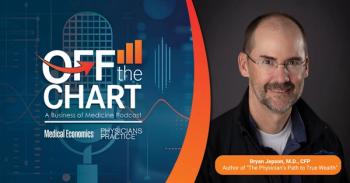
'Here's What They Should Really Teach in Medical School'
There’s no education like experience, says Julie Schopps, a North Carolina-based pediatrician, about what medical school should teach.
Medical school is full of details - of physiology and pathophysiology, of minutiae of microorganisms and pharmacology, of hours upon hours of studying and development. And the all-too-brief lectures on ethics, the simulated patient exercises, and the interview-skill development. All helpful, definitely getting better, but are these the most critical things we need to know? I wonder.
I have now been a pediatrician for 20 years, in private practice for 17 of those years. Medical school and residency are powerful teachers, but I now know that experience trumps them both. Many times I have explained to a young patient's parents that while I was taught one thing in medical school, practical experience leads me to advise them very differently. I wish they had taught me how to share bad or even slightly disappointing news with a patient or parent. It is terribly difficult to have to tell a friend that her daughter has a mass on her liver and that she needs to go to a specialist to find out more. No one tells you how that affects you at the moment and years later. No one tells you how hard it is to know that child is the same age as your own daughter. No one tells you how much joy you can know to see that same child grow up into a lovely young lady who is still friends with your daughter. Medical school needs to explore this very human task of assisting other people with these very difficult issues. Even telling a new mother that her newborn has to stay an extra day because of jaundice can be difficult. Ninety percent of the time, even this little disappointment results in tears. Can we be prepared to help someone handle this?
I wish they had welcomed private practitioners into the lecture halls and small group sessions where their wisdom would be valued and passed on to a whole new generation of physicians. How often I recall somewhat derisively referring to "the outside doc" or "the PMD," as if they didn't know anything. Surely only we and our professors really knew all of the finer points of medicine. Oh, how wrong we were. Private doctors often really know their patients better than the specialists, better than the academicians. Why can't we then appreciate each other for our strengths and for the contributions each of us makes to the patient's care? Can we teach something like that to up-and-coming students?
I wish medical schools would focus at least equally on the human aspects of medicine and caring for other human beings as they do on the amazing technological advances in care and diagnosis that we have seen in the last decades. How do you decide what tests are really needed, when the patient truly needs to see a specialist, and when to worry? How do you teach someone how to really look at a patient in the eyes to see what is there? This is not found in a cookbook. It takes time and experience and intuition that we can't easily explain. Can we teach that in medical school?
I have come to appreciate my first professor's comment in my first medical school lecture. "Fifty percent of what we teach you is incorrect; we just don't yet know which 50 percent it is." I found that a little dismaying at first and asked myself if this daunting journey I was now committed to was going to be worth all the trouble. Now I understand the wisdom and humility it took for him to say that. Trying to keep up with continuing medical education is daunting and requires great diligence. Are we still humble and cognizant that we may not yet know which 50 percent we are getting right?
I wish medical school would start teaching us to have patience with our patients. All too often I hear of patients being berated for being overweight or noncompliant or smelly or difficult. Sometimes I wish we would just stop and think about how much a little milk of human kindness or a word of encouragement might be able to make a difference. I have had patients, even relatively young patients, repeat, recall, and really take to heart a word here, a phrase there, a "homework assignment" (like getting rid of a pacifier, or planning exercise every day), or a little snippet of encouragement. They will tell you years later of how much that meant to them or that they never forgot what you said. Should we then not be even more careful with our words and our directives? Even if it means being patient with them for years and years?
I wish they would teach us in medical school about the importance of taking care of ourselves. So much of being a doctor denies the humanness of the doctor and asks us to give and keep giving. We should not give so much of ourselves away that patients become burdens and we become empty shells. We need hobbies and interests and days off and vacations and permission to breathe sometimes. We need family time and crazy friends and people around us who let us just be a mom or a wife or a volunteer at our children's school. We need people who don't keep putting us on an impossible pedestal and who allow us to be. There is a clear danger of burnout - especially if we move from the intensity of medical school into the increased intensity of residency and fellowship and continue on into our professional lives at the same breakneck pace. We need permission to focus on a healthy life balance; our patients are watching us.
We are immensely privileged to share an intimate picture of our patients' lives that few others will ever be allowed to share. It takes acquiring tremendous competencies along the way. It takes dedication to our studies, sacrifice of a large part of ourselves, commitment to quality and caring about other people. It takes a willingness to really listen, to partner together with patients and their families. It takes a great deal of humility. Looking back on my many years in practice, I recognize the blessing of this very intense journey to becoming the best doctor I could be. Should not medical school launch us well to handle all these steps? It might be hard, but shouldn't we try?
Julie Schopps is a pediatrician in private practice in North Carolina. She has spent many years trying to answer this essay's question and wondering about what we are getting right.
This article originally appeared in the February 2012 issue of Physicians Practice.
Newsletter
Optimize your practice with the Physicians Practice newsletter, offering management pearls, leadership tips, and business strategies tailored for practice administrators and physicians of any specialty.









